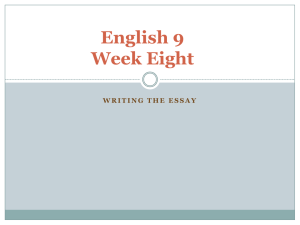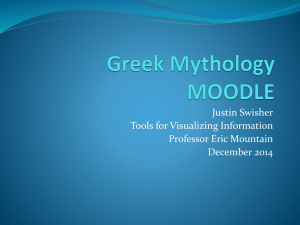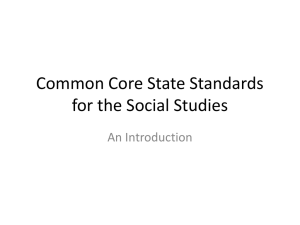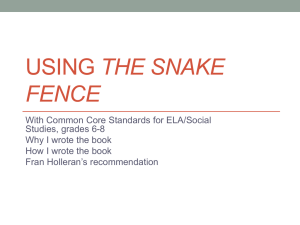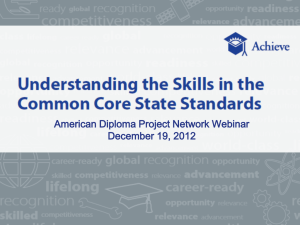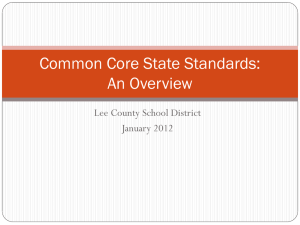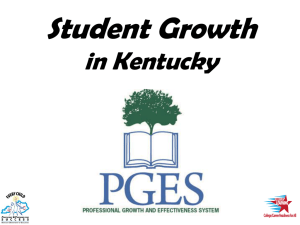Parent information presentation
advertisement
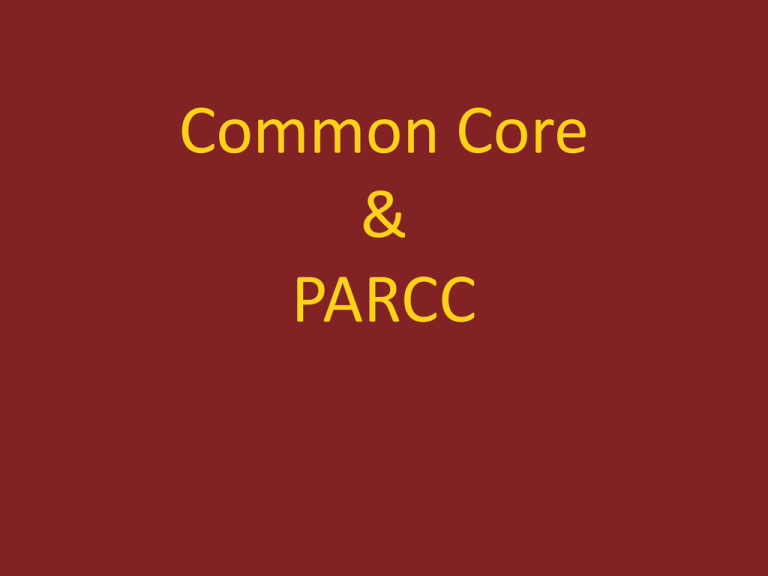
Common Core & PARCC • The NJ State Board of Education on June 16, 2010 adopted a resolution calling for New Jersey’s curriculum standards to be aligned with national Common Core Standards in math and language arts literacy. • The State Board’s resolution “directs that school district curricula for all students be aligned with these revised K-12 standards in mathematics and English language arts and literacy in history/social studies, science, and technical subjects,” according to the phased in timeline. • Change requires all teachers and all departments to be responsible for implementing Common Core State Standards Common Core Design 2 Categories 1. College and Career Readiness Standards – What students are expected to learn when they have graduated from high school 2. K – 12 Standards – English Language Arts and Literacy in Science, Social Studies, and Technical Subjects – Mathematics Common Core Design Fewer - Clearer - Higher • Aligned to requirements for College and Career Readiness • Based on Evidence 21st Century 3 R’s • Robust – Higher Level Thinking • Relevant—Engagement, Student Involvement, Student Centered • Rigorous—High expectations, Critical Thinking, Challenging Thinking CCR and ELA Standards • College and Career Readiness Common Core Anchor Standards • Reading – Informational Text – Literature – Foundational Skills • Writing • Speaking and Listening • Language What does it mean to be College and Career Ready in ELA and Literacy • Demonstrate independence • Build strong content knowledge • Respond to varying demands of audience, task, purpose, and discipline • Comprehend as well as critique • Value evidence • Use technology and digital media strategically and capably • Understand other perspectives and cultures College and Career Readiness Anchor Standards--Reading • Broad expectations across grades and content areas • Based on evidence about college and workforce training expectations • Range and Content • Same in Kindergarten as they are in Senior Year College and Career Readiness Anchor Standards--Reading CCSS.ELA-LITERACY.CCRA.R.1: Read closely to determine what the text says explicitly and to make logical inferences from it; cite specific textual evidence when writing or speaking to support conclusions drawn from the text. CCSS.ELA-LITERACY.CCRA.R.2: Determine central ideas or themes of a text and analyze their development; summarize the key supporting details and ideas. CCSS.ELA-LITERACY.CCRA.R.3: Analyze how and why individuals, events, or ideas develop and interact over the course of a text. CCSS.ELA-LITERACY.CCRA.R.4: Interpret words and phrases as they are used in a text, including determining technical, connotative, and figurative meanings, and analyze how specific word choices shape meaning or tone. CCSS.ELA-LITERACY.CCRA.R.5: Analyze the structure of texts, including how specific sentences, paragraphs, and larger portions of the text (e.g., a section, chapter, scene, or stanza) relate to each other and the whole. CCSS.ELA-LITERACY.CCRA.R.6: Assess how point of view or purpose shapes the content and style of a text. CCSS.ELA-LITERACY.CCRA.R.7: Integrate and evaluate content presented in diverse media and formats, including visually and quantitatively, as well as in words.1 CCSS.ELA-LITERACY.CCRA.R.8: Delineate and evaluate the argument and specific claims in a text, including the validity of the reasoning as well as the relevance and sufficiency of the evidence. CCSS.ELA-LITERACY.CCRA.R.9: Analyze how two or more texts address similar themes or topics in order to build knowledge or to compare the approaches the authors take. CCSS.ELA-LITERACY.CCRA.R.10: Read and comprehend complex literary and informational texts independently and proficiently. SAME IN KINDERGARTEN AND 12th GRADE College and Career Readiness Anchor Standards • Previous Example in Reading • Also Anchor Standards in Writing, Speaking and Listening, and Language Grade Level Standards • Specific Requirements at each Grade Level • Example—Grade 2 CCSS.ELA-LITERACY.RI.2.1: Ask and answer such questions as who, what, where, when, why, and how to demonstrate understanding of key details in a text. CCSS.ELA-LITERACY.RI.2.2: Identify the main topic of a multiparagraph text as well as the focus of specific paragraphs within the text. CCSS.ELA-LITERACY.RI.2.3: Describe the connection between a series of historical events, scientific ideas or concepts, or steps in technical procedures in a text. • Example—Grades 11 & 12 CCSS.ELA-Literacy.RI.11-12.1: Cite strong and thorough textual evidence to support analysis of what the text says explicitly as well as inferences drawn from the text, including determining where the text leaves matters uncertain. CCSS.ELA-Literacy.RI.11-12.2: Determine two or more central ideas of a text and analyze their development over the course of the text, including how they interact and build on one another to provide a complex analysis; provide an objective summary of the text. CCSS.ELA-Literacy.RI.11-12.3: Analyze a complex set of ideas or sequence of events and explain how specific individuals, ideas, or events interact and develop over the course of the text. Shifts in English Language Arts (ELA) • Building knowledge through content rich nonfiction • Reading, writing, speaking grounded in evidence from text, both literary and informational • Regular practice with complex text and its academic language Shared Responsibility “The grades 6–12 standards are divided into two sections, one for ELA and the other for history/social studies, science, and technical subjects. This division reflects the unique, timehonored place of ELA teachers in developing students’ literacy skills while at the same time recognizing that teachers in other areas must have a role in this development as well.” From Common Core State Standards for ELA and Literacy in History/Social Studies, Science, and Technical Subjects, p.4 SHIFT MEANS CHANGE IN PRACTICE FROM…. TO…. Content Knowledge primarily from teacher led lecture Content knowledge comes from a balance of reading, writing, lecture, and hands-on experience Mathematics Design • 8 Standards for Mathematical Practice 1. Make sense of problems and persevere in solving them. 2. Reason abstractly and quantitatively. 3. Construct viable arguments and critique the reasoning of others. 4. Model with mathematics. 5. Use appropriate tools strategically. 6. Attend to precision. 7. Look for and make use of structure. 8. Look for and express regularity in repeated reasoning. • Same across grade levels. Same in Elementary and HS Standards for Math Content • K – 8 Standards presented by grade level • Organized into domains that progress over several grade • Grade introductions give 2 – 4 focal points at each grade level • High School standards presented in conceptual theme – Number and Quantity – Algebra – Functions – Modeling – Geometry – Statistics and Probability 3 Shifts in Math • Focus: Narrow content and delve deeper into topics. Focus where standards focus • Coherence: Think across grades and link to major topics (how does what students learn in 2nd grade math affect what they learn in algebra) • Rigor: In major topics, pursue conceptual understanding, procedural skill and fluency, and application Heights Focus Elementary – ELA Curriculum and Unit Plans Updated and Aligned – Math Pilots (Go Math and enVisions) – Social Studies incorporated into ELA non-fiction – Science required Next Generation Science Standards will be updated over 3 years with implementation to begin September 2017 – Specials implementing district inititatives Junior-Senior High School – All Required HS English and Math Courses Updated and Aligned – Required HS Science and Social Studies Updated and Aligned with Literacy Standards – Junior High Academic Courses to be updated and aligned for September 2015 – Technology including Business, Visual and Performing Arts, and Technology Education updated and aligned for September 2015 All teachers are required to understand Common Core and implement changes to curricula and instruction Need for District Initiatives • Because of the shifts in Common Core, all teachers are required to understand Common Core and implement changes to curricula and instruction • Focus on Measurable Objectives, Tracking Progress, and Questioning • Common Core and focus on College and Career Readiness requires students to think critically, problem solve, and delve deeper into concepts rather than just being exposed to large amounts of information Assessment • During 14-15 School year, students will be assessed on Common Core State Standards PARCC PARCC • All students in grades 3 – 11 will test – – – – Grades 3 – 11 will take grade level ELA Grades 3-7 grade level math Grade 8 will take either grade level or Algebra HS students will take math assessment for course enrolled— Algebra, Geometry, Algebra II • Two required summative assessments • Each has 20 day testing window • PBA—Performance Based Assessment (March 2– March 27) – Each student will test 5 days (3 ELA & 2 Math) • EOY—End of Year Assessment (April 20 – May 15) – Each student will test 4 days (2 ELA & 2 Math) GO GARNETS!!!
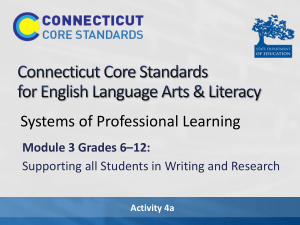
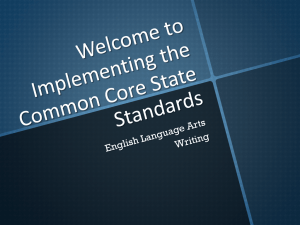
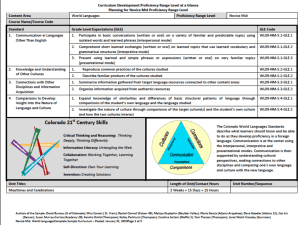
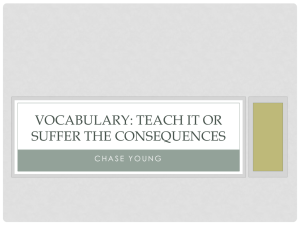
![iPads_and_Writing_2013[1]](http://s2.studylib.net/store/data/005383991_1-1bc8c0f2382c2ccb89e094c534f531f0-300x300.png)
